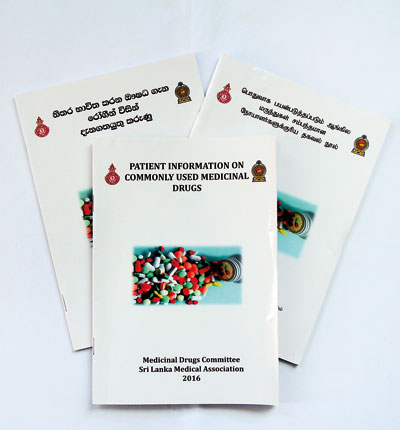News
When to take what: It’s important to know your medicines

Emeritus Prof. Gita Fernando. Pic by Anurada Bandara
Patients and medications have been on the mind of this Emeritus Professor of Pharmacology for a while as she feels that it is a “neglected” sphere.
Sometimes there is not enough time spent on looking at the symptoms and what disease they point to, says Consultant Physician and Emeritus Prof. Gita Fernando attached to the Sri Jayewardenepura University, pointing out that just a cursory check of the patient and a quick prescription are not good enough.
There should be an explanation of what the medications are, how they will impact on the patient, curing the disease as well as what side-effects to expect, she says.
This is why the Sri Lanka Medical Association’s Medicinal Drugs Committee chaired by her has gone that extra mile to produce the booklet, ‘Patient information on commonly used medicinal drugs’ in all three languages of English, Sinhala and Tamil, to educate the public.
The printing costs amounting to Rs. 7 million have been borne by the National Health Development Fund of the Health Ministry.
Some of the booklets have already been distributed to households through the Medical Officer of Health (MoH) clinics in Kalutara and Ratnapura, with the feedback indicating that people had read and understood the contents.
Stressing that it is the right of the patient to ask questions not only from the doctor but also the pharmacist who issues the medications when the doctor’s prescription is presented, Prof. Fernando details how much work went into the publication of this crucial booklet.
Edited by Prof. Fernando, with the Co-Editors comprising respected medical professionals Prof. Shalini Sri Ranganathan, Prof. Chandanie Wanigatunge and Dr. Pradeepa Jayawardane and Pharmacist Chinta Abayawardana, the booklet though slim and handy covers a wide range of topics. While the Editors have doubled up as authors for some articles, many eminent practitioners have also chipped in to make it simple and readable. Each topic had been discussed at length before the relevant information went into print.
The topics covered include: Antipyretics and cough syrups for children; Antibiotics; Diabetes – insulin or tablets?; Drugs in hypertension; Management of heart pain (angina); Cholesterol and the treatment of high cholesterol; Blood thinners; Inhaled medicines in asthma; Non-steroidal anti-inflammatory drugs (NSAIDs); Oral and emergency contraceptive pills (OCPs and ECPs); Vitamins; Household poisoning; and How pharmacists can help patients in the correct use of medicines.
Referring to ‘rational use’, Prof. Fernando explains in the Preface that it is the use of safe and effective medication, appropriate to clinical needs at affordable prices.

The easy-to-understand booklet on ‘Patient information on commonly used medicinal drugs’. Pic by Indika Handuwala
She urges patients to tell their doctor if they are taking any other medication or have a past history of allergy. “If you are pregnant or breastfeeding, you should inform the doctor, as taking some drugs then may harm the baby.”
‘Generics’ and ‘brands’ become easy to understand under her expert explanations. “There is only one generic name (medicinal name) for a drug, whereas there may be several brand names given by drug manufacturers. The active ingredient in generic and brand names is the same though the colour, shape and flavour may be different. Generic drugs are cheaper than brands.”
In a word of advice to doctors, she tells the Sunday Times that wherever seen, be it in the state or private sectors, the patient has to be given priority. Conceding that there are “lots” of patients in the Outpatients Department or clinics of state hospitals, she says that however rushed the doctor is, some time has to be spent explaining what ails the person and what treatment will work to make the person feel better.
Reiterating the well-known ‘protocol’ that needs to be followed as soon as a patient walks into a doctor’s room, she says it is vital to put the patient at ease and then take down a proper case history. Otherwise, the doctor will not be able to decide what disease is affecting the patient, the treatment plan and future management.
Sometimes patients may not give the required answers to the questions of the doctor. Then the patients should be gently guided in the right direction by the doctor. At other times, the patient may be embarrassed to talk about the symptoms but it is very important to get the history right, says Prof. Fernando, adding that it is thereafter that the patient should be subjected to a thorough clinical examination.
A logical decision should be taken then as to what tests or investigations are relevant. It is unnecessary to order a battery of tests as they are expensive, according to her.
“A treatment plan, meanwhile, is vital because it would prevent the unnecessary prescribing of drugs, especially antibiotics in the light of red danger signs occurring not only in Sri Lanka but across the world of anti-microbial resistance. This is setting off alarms whether the world is heading towards a gloomy era similar to the pre-antibiotic age,” she adds.
She cites the example of antibiotics being unnecessary in the case of fevers, unless it has been determined that it is an infection caused by a bacteria. In the case of a urinary tract infection (UTI) with the symptoms of pain when passing urine accompanied by the patient having slight fever, a urine full report is adequate to start the medication and ideally a culture should follow. “The patient should be advised to give a urine sample and then start the medication soon after, to relieve the patient’s symptoms without awaiting the culture results,” she says picking up other fevers due to sore throats which could be caused by viral infections. These do not need antibiotics.
While in the booklet, Prof. Fernando strongly advises the patient to take medicines according to a prescription written by a qualified doctor, she urges that if the patient cannot understand what is written on the prescription, not only the doctor but also the pharmacist should be asked for clarification.
(If anyone wishes to obtain the booklet, which is being distributed free of charge, they may contact the State Pharmaceuticals Corporation or any Rajya Osu Sala outlet)

